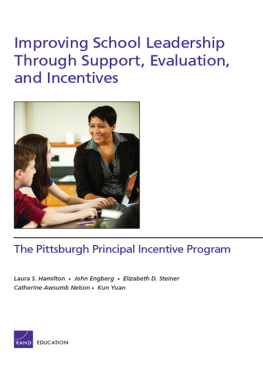Improving School Leadership
Through Support, Evaluation,
and Incentives

The Pittsburgh Principal Incentive Program
Laura S. Hamilton John Engberg Elizabeth D. Steiner
Catherine Awsumb Nelson Kun Yuan
Sponsored by the Pittsburgh Public Schools
 EDUCATION
EDUCATION
The research in this report was produced within RAND Education, a unit of the RAND Corporation. The research was sponsored by the Pittsburgh Public School District.
Library of Congress Cataloging-in-Publication Data
Improving school leadership through support, evaluation, and incentives [electronic resource] : the Pittsburgh principal incentive program / Laura S. Hamilton [et al.].
1 online resource.
Includes bibliographical references.
Description based on print version record and CIP data provided by publisher; resource not viewed.
ISBN 978-0-8330-7632-8 (epub) ISBN 978-0-8330-7633-5 (prc) ISBN 978-0-8330-7634-2 ( pdf) ISBN (invalid) 978-0-8330-7617-5 (pbk. : alk. paper)
1. School improvement programsPennsylvaniaPittsburghCase studies. 2. Educational leadershipPennsylvaniaPittsburghCase studies. 3. Educational changePennsylvaniaPittsburghCase studies. 4. School principalsPennsylvaniaPittsburghCase studies. I. Hamilton, Laura S.
LB2822.83.P43
371.207dc23
2012022402
The RAND Corporation is a nonprofit institution that helps improve policy and decisionmaking through research and analysis. RANDs publications do not necessarily reflect the opinions of its research clients and sponsors.
RAND is a registered trademark.
Cover photograph courtesy iStock
Copyright 2012 RAND Corporation
Permission is given to duplicate this document for personal use only, as long as it is unaltered and complete. Copies may not be duplicated for commercial purposes. Unauthorized posting of RAND documents to a non-RAND website is prohibited. RAND documents are protected under copyright law. For information on reprint and linking permissions, please visit the RAND permissions page (http://www.rand.org/publications/permissions.html).
Published 2012 by the RAND Corporation
1776 Main Street, P.O. Box 2138, Santa Monica, CA 90407-2138
1200 South Hayes Street, Arlington, VA 22202-5050
4570 Fifth Avenue, Suite 600, Pittsburgh, PA 15213-2665
RAND URL: http://www.rand.org/
To order RAND documents or to obtain additional information, contact
Distribution Services: Telephone: (310) 451-7002;
Fax: (310) 451-6915; Email:
Preface

In 2007, the Pittsburgh Public Schools (PPS) received funding from the U.S. Department of Educations Teacher Incentive Fund (TIF) program to adopt a set of reforms designed to improve the quality of leadership, including a revised compensation program for principals. The resulting program, the Pittsburgh Urban Leadership System for Excellence (PULSE) initiative, represents a multifaceted approach to improving school leadership and student learning throughout the district. A key component of PULSE is the Pittsburgh Principal Incentive Program (PPIP), a system of performance-based evaluation and compensation through which the district provides principals with support, assistance, and performance-based financial awards tied to measures of their leadership practices and student achievement growth. PULSE and PPIP reflect a growing research-based understanding of the critical role that principal leadership plays in districts efforts to improve student achievement.
The RAND Corporation partnered with PPS on this grant and played two roles in the project. First, RAND researchers provided advice on the design of the measures used to evaluate principal performanceparticularly the measures based on student achievement. Second, RAND served as the projects evaluator. This report addresses the second role, presenting the key findings from the evaluation and discussing their implications for principal evaluation policy and practice. The RAND team provided formative feedback, including specific recommendations for program improvement, directly to PPS through internal memos. This monograph is the final product of the evaluation and focuses on lessons that can be applied to the broader field beyond PPS. It should be of interest to practitioners, policymakers, and researchers designing, implementing, or studying principal evaluation systems.
This research was conducted in RAND Education, a unit of the RAND Corporation. Funding for this work was provided by a subcontract to PPS on the districts TIF grant from the U.S. Department of Education.
For more information about RAND Education, see
http://www.rand.org/education.html
Figures

Tables

Summary

In 2007, the Pittsburgh Public Schools (PPS) received funding from the U.S. Department of Educations Teacher Incentive Fund (TIF) program to implement the Pittsburgh Urban Leadership System for Excellence (PULSE), a set of reforms designed to improve the quality of school leadership throughout the district. A major component of PULSE is the Pittsburgh Principal Incentive Program (PPIP), a system of support, performance-based evaluation, and compensation. The new compensation system has two major components: (1) an annual opportunity for a permanent salary increase of up to $2,000 based primarily on principals performance on a rubric that is administered by assistant superintendents (who supervise principals) and that measures practices in several areas and (2) an annual bonus of up to $10,000 based primarily on student achievement growth. The district also offered bonuses to principals who took positions in high-need schools. PPIP provided principals with several forms of support, such as professional development focused on improving leadership, feedback and coaching from assistant superintendents, and participation in Directed Professional Growth (DPG) projects that allowed principals to choose an area in which to work to improve their own skills. The RAND Corporation served as the evaluator of PPIP and examined implementation and outcomes from school years 20072008 through 20102011. Although the district is likely to continue implementing much of what constitutes PPIP, this report focuses only on the period during which PPIP was being funded by the TIF grant. The evaluation addressed the following broad questions:
- What is the districts theory of action regarding how PPIP is expected to promote improved student outcomes?
- How were the PPIP capacity-building interventions implemented, and how have principals responded to them?
- To what extent have principals skills and practices changed over the course of PPIP?











 EDUCATION
EDUCATION